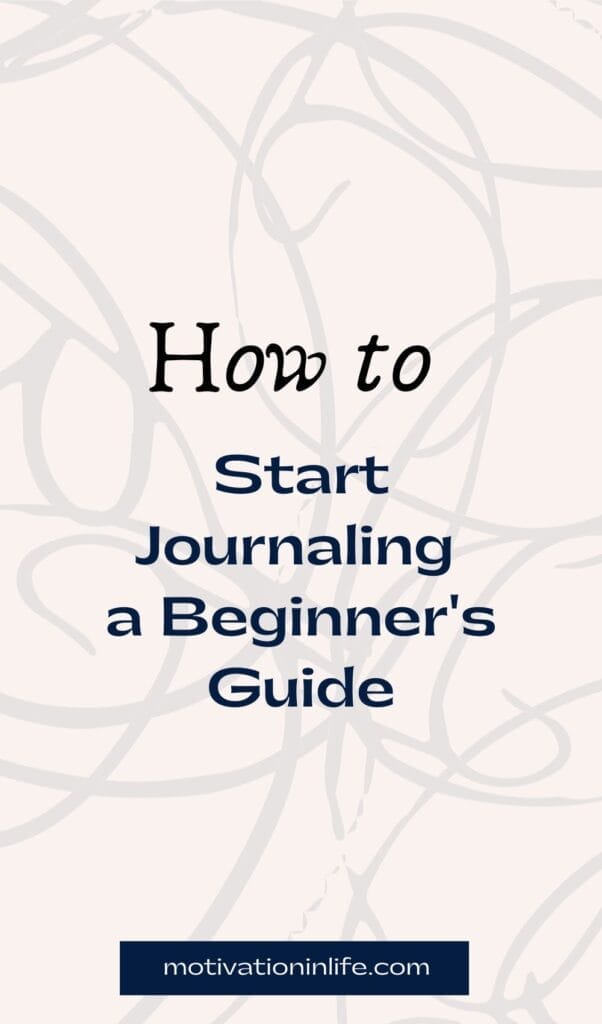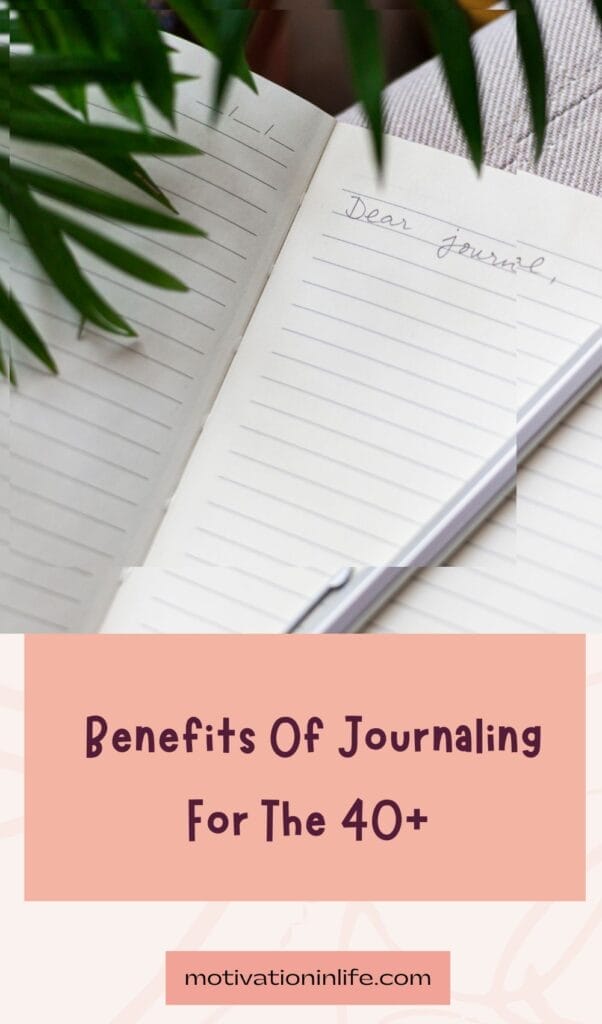10 Remarkably Simple Journaling Ideas For Beginners To Follow (For The 40+)
“All the noise in my brain, I clamp it to the page so it will be still.”
Barbara Kingsolver
Journaling is a great way to process your thoughts and emotions. Once you hit your 40s and beyond, you need a way to channel your thoughts, and journaling can be a great tool for you. It can also be a fun way to document your life.
Yet, if you’re unsure how to start journaling, don’t worry! This blog post is all about easy journaling ideas for beginners that will help you get started.
Also, journal writing is a great idea if you’re looking for a new hobby that can help you relax and de-stress. It’s a simple activity that anyone can do irrespective of their age, and there are endless possibilities for approaching it.
Beginner ideas for journaling include journaling to
- setting goals,
- reflecting upon your day,
- or writing about whatever is on your mind.
Journaling has many benefits, some of which are not so obvious. It can help you stay on top of your mental health and reduce anxiety. Especially in your midlife, it can also help you identify patterns in your thoughts, feelings, and behaviors. You can use these patterns to make changes that will lead to a happier life.
Table of Contents
AFFILIATE DISCLOSURE
This post may contain affiliate links. We may earn a small affiliate commission at no extra cost if you click on them.
motivationinlife.com is also a participant in the Amazon Services LLC Associates Program, an affiliate advertising program designed to provide a means for sites to earn advertising fees by advertising and linking to Amazon.com and Amazon.in
We may earn a small commission for our endorsement, recommendation, testimonial, and/or link to any products or services from this website.

Why You Should Develop The Habit Of Journaling In Life After 40
Since the 10th century, people have liked to keep journals, and that interest has only grown over time. Millions of people use journaling to enhance their everyday lives as a form of self-help tool.
But why do so many people journal, and why has journaling become so popular?
Have you ever considered why journaling is so immensely popular and whether you might want to start doing it yourself?
A journal is a place where you can keep a record of your journey in life. It is a place to share your thoughts with yourself. A place to be vulnerable, and let yourself be seen for who you really are.
The benefits of journaling extend far beyond just personal development. Studies show that writing down your thoughts can help you
- sleep better,
- improve your immune system,
- increase productivity,
- and even reduce stress levels.
As you reach your 40s, you have to shoulder different kinds of responsibilities and situations in life. A journal can be a great tool to analyze your thoughts and feelings, especially during difficult times. It can also be a way to understand your growth and progress over time.
There are many reasons why journaling has gained in popularity over time and why you should start a new journal today.
If you are keen on making journaling a regular habit, download The Daily Journal, which we have designed for you using the templates from Creative Fabrica.
Journaling Helps To Relieve Stress
You may not be aware, but journaling is a fantastic technique for reducing stress and anxiety. Writing down your thoughts and emotions can help clear the mind. This immediately makes you feel calmer and more relaxed. It motivates you to develop a growth mindset.
You can also use journaling to evaluate your problems and challenges in life, which anyone beyond the age of 40 has a handful to deal with!! Yet, when you can identify solutions to your problems, you feel in charge.
You can work out strategies to overcome situations that are bothering you. This, in turn, will help you feel happier and more at ease as it helps in reducing stress.
If your limiting beliefs in your 40s and beyond are causing you stress please read our blog post on Truth About What Are Limiting Beliefs And How To Identify Them (For The 40+) to get over your self-limiting thoughts.
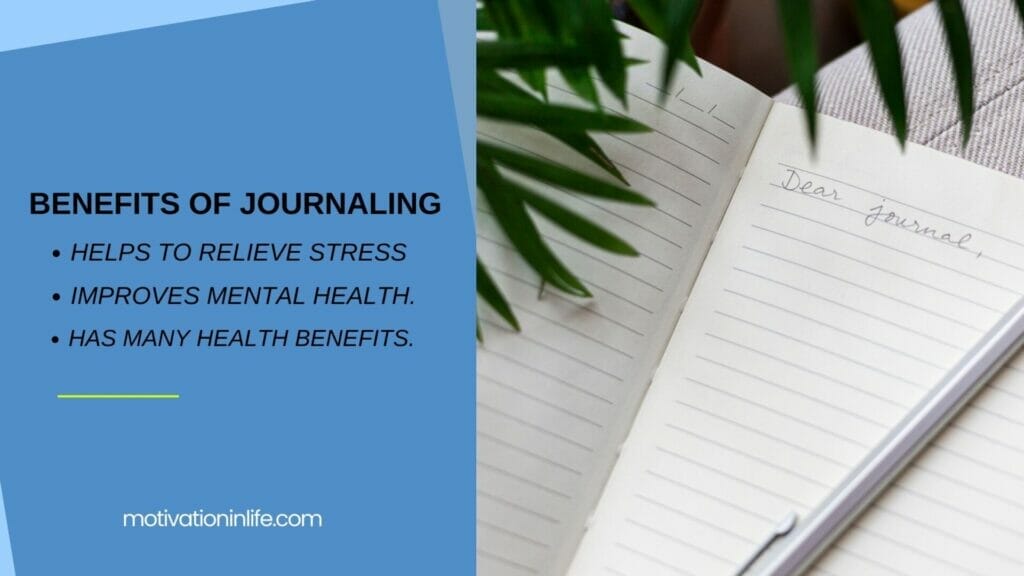
Journaling Improves Mental Health.
The mental health benefits of journaling have been proved by scientific research. It is used to alleviate the symptoms of depression, lessen anxiety, and enhance overall health.
It’s easy to get lost in your thoughts. We all have an inner critic, but for some, it can be overwhelming. Journaling can assist you in shutting down your inner critic.
You’ll be able to deal with negative thoughts, which will help you change to a more positive way of thinking.
The positive effects of journaling on mental health increase over time. After just one month of journaling, you’ll notice a significant improvement in your mood.
Journaling Benefits Your Physical Health Also.
Journaling can benefit both mental and physical health. Many studies have shown that regular journaling can:
- Boost your immune system.
- Improve your memory.
- Assist you in your recovery from trauma.
- Improve the health of your heart.
The health benefits are largely due to a decrease in tension and negativity. A healthy dose of optimism can do wonders for your body.
So, keeping a daily journal can help you become healthier both mentally and physically. It supports your personal growth in every area of life.
It is possible to improve all aspects of your life by journaling. You can use it to improve yourself in just about any way possible.
Do you want to lose weight? A journal can assist you in setting goals and tracking your progress. It will also help you figure out what is causing you to retain the weight (such as poor eating habits or emotional eating).
Your relationships, sleep, health, and stress levels can all be improved with daily journaling. Keeping a journal can help you in countless ways.
These are some of the main reasons why journaling is so popular. Journaling used to be as simple as writing down your thoughts. Yet, now there many different types of Journaling you can practice.
Examine the various types before deciding which one is best for you!!
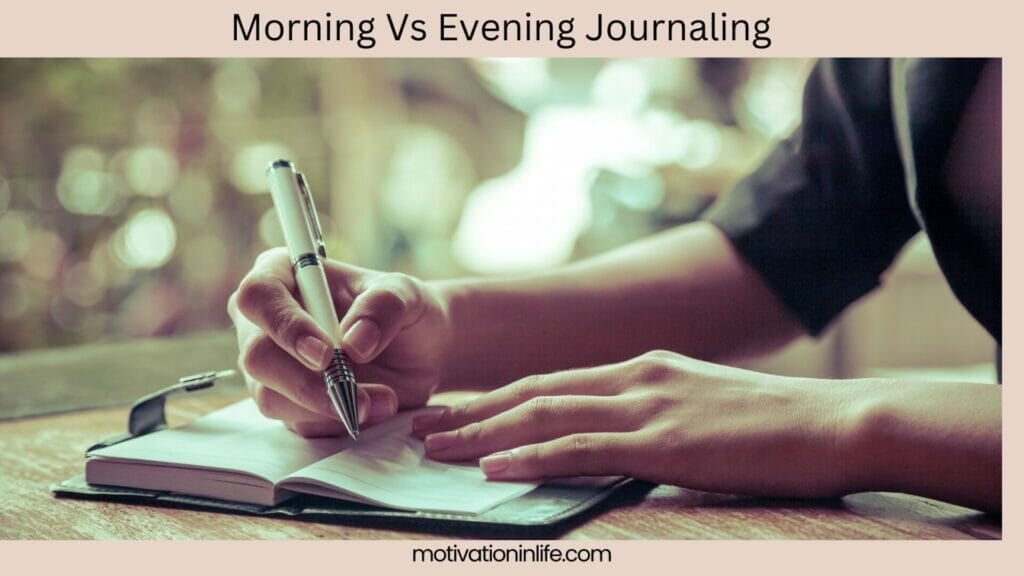
When Is The Most Appropriate Time to Journal?
Journaling at specific times, according to some experts, can help make the practice more effective. However, if you are looking into the best time to journal, you’ll find a lot of conflicting advice.
Some say you should always do it in the morning, while others say it’s better to do it at night.
The truth is that no one time works best for everyone. What is best for someone else may not be best for you. As a result, it is best to compare the advantages of writing in the morning and evening.
This will help you decide what is ideal for you.
Journaling In The Morning: Benefits And Drawbacks
Morning is the most popular time of the day for journaling. Doing it first thing in the morning can have some very positive effects.
The benefits of morning journaling include:
- It aids in creating positive goals for the day.
- You can remember your dreams better.
- It can stimulate the brain and make you more focused.
- It will be easier for you to make progress once you have analyzed all your thoughts.
Writing in the morning is thus ideal for those who use the dream journaling technique or want to be more assertive during the day.
It also ensures that you stick to your journaling routine because fewer things are likely to come up first thing in the morning.
So, what about the disadvantages of morning journaling? The events of the previous day will no longer be as fresh in your mind. So it may be difficult to recall things if you need to.
Your mind is also groggier in the morning, so you may be unable to solve any problems you are facing.
The Benefits And Drawbacks Of Evening Journaling
Evening journaling can also provide some distinct advantages. For instance:
- You can go over your day.
- It can assist you to de-stress
- You sleep better.
The evening is commonly a time of increased creativity. The events of the day are still fresh in your mind when you journal at night.
You’ll be able to analyze them and get them off your mind before going to bed. As a result, you will sleep much better.
If you are a night owl, you may find it easier to write in your journal in the evenings. This is where you will be most creative.
Of course, there are some disadvantages to writing in the evenings.
Some people have difficulty sleeping if they try to journal before going to bed. This is because thinking about your problems right before going to bed can cause them to become ingrained in your mind.
It may also cause you to stay up later than usual if you write for a longer period, for example.
When it comes to journaling, there is no right or wrong time to start. Yet, for beginners, it is important to find a time that works best for them.
As a person who has started developing the journaling habit, it may be helpful to set aside some time each day to write down your thoughts. This can help you get into the habit of journaling and make it a part of your daily routine.
If you’re not sure where to start, try setting a timer for 10-15 minutes and writing down whatever comes to mind.

The Best Ways To Create A Calm Journaling Space
You may think of journaling as something you do anywhere, at any time. But if you really want to get the most out of your journaling sessions, it’s important to create a space that’s conducive to calm and reflection.
Here are some great ideas for creating a relaxing space to journal.
Find A Peaceful Place
The first thing to think about when looking for the perfect place to write in a journal is whether it is quiet. You’ll want a quiet place to write to express your feelings and emotions clearly.
If you have toddlers, you could perhaps do it after they have gone to bed, or you can make a quiet corner in your room where you will not be disturbed.
Any comfortable and quiet area with some good lighting is a good place to journal. When it’s warmer outside, it might even be a space outside.
Remove All Clutter
There should be no clutter wherever you decide to set up your journaling area. Our thoughts can also become cluttered when the spaces are disorganized. So, tidy up and organize the space.
The better organized your journaling space is, the easier it will be to write in.
Include A Plant In The Space
Create the most comfortable environment you can for journaling. This implies that it should be both comfortable and nice to look at.
When you add a plant to a room, it can make it feel more peaceful and calm. There are countless plant varieties available, so you can find one that suits your tastes.
Additionally, it has been proven that plants increase the amount of oxygen in the air, enhancing its quality. Since not every plant will improve air quality, be sure to search for plants that do.
Use The Energy Of Smell
Use the sense of smell to set the mood for your writing sessions. Using a Lavender scent, for example, can help you create a relaxing, calming environment. Alternatively, a citrus scent can help you focus and concentrate.
Consider a scent that makes you feel more relaxed and focused. If you incorporate your favorite scent into your journaling routine, you’ll look forward to doing it.
Have Comfortable Seats Available
Focusing on comfortable seating is another important aspect. If you don’t have a comfortable seat, you won’t want to write, or at least not for longer sessions.
You could either choose to do your writing on your bed or in a chair designed specifically for office work. Some people like to write on a big, oversized beanbag. The more at ease your writing environment is, the longer you will likely stick with it.
It’s not hard to make a peaceful place to write in your journal. The aforementioned tips will help you set up the perfect environment for journaling, whether you do it at a desk in your office or your bed.

How To Establish A Routine For Daily Journaling
You must journal every day if you want to reap the rewards that it has to offer. Journaling is essentially a habit that you develop, and it can take some time to integrate into your everyday routine.
If you want to start a daily journal, you’ll find below the best ways to get started.
Keep The Advantages Of Journaling In Your Mind
If you try to write in your journal daily, some days might be harder than others. When you’re first starting, it’s tempting to think, “I’ll just skip journaling for today and do more tomorrow.”
But, if you permit yourself to do it once, you will do it again. So stop procrastinating and get started.
Create small cards that remind you of the advantages to help you get through the tougher days. Whenever you need inspiration, you can refer to them for ideas.
There will be times when keeping a journal will not be a priority for you. Any kind of stress, disease, or important life event is all part of life.
Journaling every day during difficult times may not be feasible. That is ok and you should not allow those times to overpower you. Get back to journaling once you feel comfortable.
If motivation is something that you are struggling with in your life after 40 read our blog post on 15 Proven Tactics Of How To Get Motivation Back In Life (For The 40+).
Plan A Journaling Ideas Session
If you schedule time for journaling ideas, you might find it easier to establish a routine. Set aside at least 10 minutes each day, as you would for an appointment, to start writing in your journal.
Some people prefer to journal in the morning, while others prefer to do so at night. After determining what works for you, schedule daily journaling at the same time. You’ll notice that it quickly becomes a habit.
Take It One Day At A Time
One of the most common mistakes people make when trying to journal each day is setting unrealistic goals for themselves. For instance, many believe that they must write extensively and that each piece must be a masterpiece.
The truth is that you only need to start small. You don’t have to write a great deal or make sure you’re writing something important.
The key is to simply write. On days when you are struggling, set up a timer for 10 minutes. You might discover that once you begin, the words just flow.
Maintain A Physical Journal
Nowadays, you can either journal online or in a physical journal. While online journals appear to be more convenient, they lack the allure of a physical journal. A physical journal is fun to use because something is luring about writing in one.
So, if you wish to maintain a daily journaling habit, you should purchase a journal that can be written in.
This is more so in the beginning when you are trying to establish the habit to journal. Slowly as you master the habit you can shift to using a digital journal.
These are a few of the best ways to get yourself in the habit of journaling every day. Remember that it may take some time to integrate journaling into your daily routine. The more you work at it, the easier it will become.
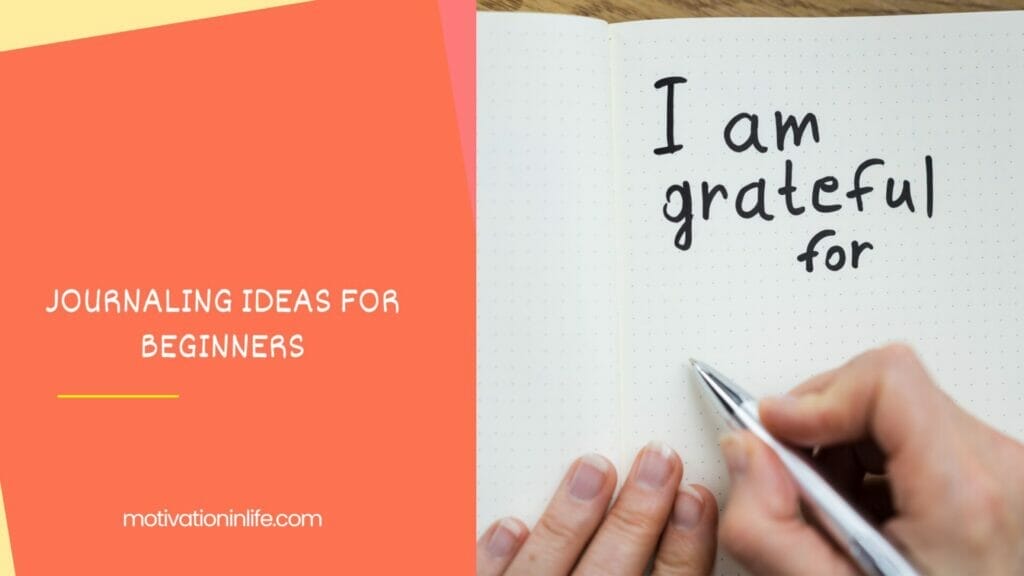
10 Journaling Ideas For Beginners
If you’re new to journaling, it can be daunting to know where to start. That’s why we’ve compiled a list of journaling prompts for beginners!
These prompts will help you get started on your journaling journey. Choose one (or a few) of the prompts below and start writing. Before you know it, you’ll be a pro at journaling!
Here are 10 journaling ideas for beginners that will help get you started on your journey of self-discovery.
1) Write about your life experiences.
2) Document your thoughts and feelings about current events.
3) Record your dreams and nightmares. Prepare a bucket list of all your wishes.
4) Write about your current struggles and how you can overcome them,
5) Express gratitude for the good things in your life.
6) Set goals for yourself: What do you want to achieve in the next week, month, or year?
7) Track your mood: Write down how you’re feeling each day, and look for patterns over time.
8) Write about your day, Your best and worst parts of the day.
9) Draw a picture of your day and write a letter to yourself.
10) Did you meet someone or attend a party or event? Write about how you felt about this event or person.
Once you know what you want to achieve, you can choose journal entry ideas that work best for you.

Techniques For Better Journaling
As a beginner, you are always trying to figure out the best journaling method possible.
There are numerous excellent techniques and journaling ideas for beginners to choose from. All the ideas for a journal entry have their own set of advantages and disadvantages.
The most important thing to keep in mind when looking for the best journaling tips and methods is that what works for one person might not work for another.
Experimenting with various techniques will allow you to determine which one works best for you. Having said that, some journaling techniques are known to be more effective for self-growth than others.
Here are some of the best journaling topics, ideas, and techniques for beginners to help you become a better version of yourself.
Gratitude
Gratitude journaling may be the most effective technique for personal development. This entails jotting down the things you are thankful for every day.
A gratitude journal can change your mindset in just 21 days, according to studies. It teaches you to be more optimistic about life and to be grateful for what you have.
Most of the time, you only worry about what you want and what you don’t have. By shifting your focus to the positive aspects of your life, you can become happier, healthier, and more content.
We have designed a beautiful Gratitude Journal for you to get you started on your journey of Journaling. Download Your Copy and Get Started Today!!
Dreams
A dream journal might seem like an odd way to help you grow as a person, but it can be very helpful. Maintaining a dream journal has proven to help with mindset improvement and personal development.
Dreams and mental development have been linked clearly. The emotions you feel in your dreams may be related to your mind’s ability to deal with and interpret information.
It is believed that the skills you learn while awake are reinforced in your dreams.
So, analyzing your dreams can provide you with the information you need to make changes in your life. Especially, when you want to identify any emotions, characteristics, or fears you may be experiencing.
As soon as you wake up, begin writing down your dreams. You can then go over them again later to see what they might mean.
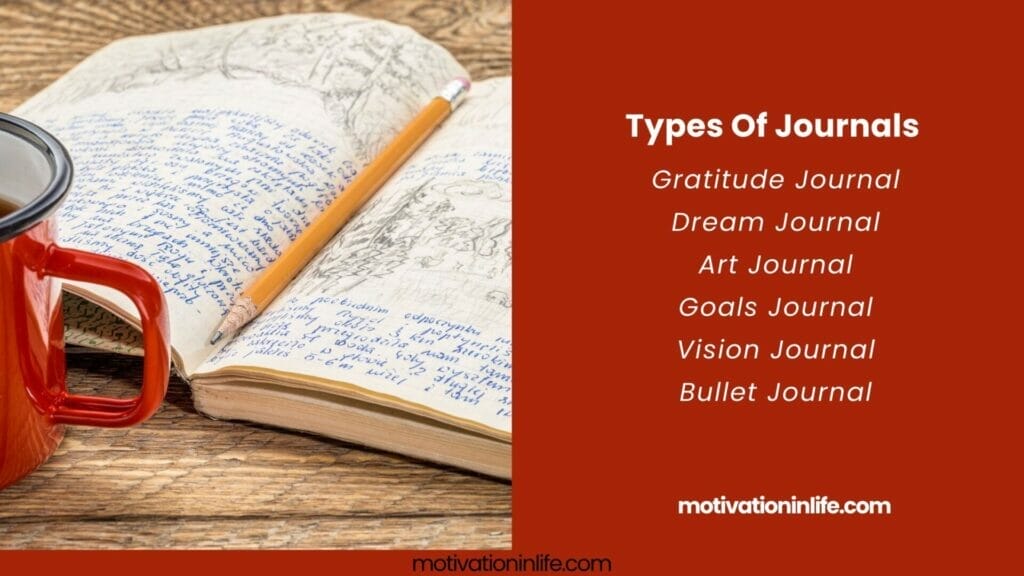
Goals/Visions/Art
Writing about your goals and visions is another popular journaling technique. A goal-setting journal could be one of the most effective ways to improve yourself. It can be used to work on almost anything you want to alter.
You may want to broaden your cultural horizons by traveling more. Or may want to lose some weight and become healthier in general.
Whatever aspect of yourself you are attempting to improve, a goal or vision, or an art journal can be extremely beneficial.
You essentially record your goals in a goal journal and then monitor your progress. You can use vision journals or art journaling to write or draw about your ideal life. They are also more visually oriented.
For example, you could include or draw images of things you would like to accomplish in your ideal life.
Bullet Journaling
Another very popular form of journaling is bullet journaling. A bullet journal is a fantastic way to get organized and track your life. You can use it for anything from keeping track of your to-do list to recording your daily thoughts and musings.
If you’re new to bullet journaling, you can view this tutorial on bullet journal ideas for journaling prompts and Bujo inspiration.
As you can see, there are several types of journaling you can use. These are some of the best ideas to start journaling.

How To Choose A Beginner Journal Style That Fits Your Personality
Choosing a beginner journaling style that fits your personality is important when you want to write authentically.
There are many different styles of writing and they all have their benefits and drawbacks.
The most popular journal styles are the following:
Free-form: This style of writing is more spontaneous and less structured.
Diary: The diary format is used to record daily events, thoughts, feelings, or other personal information. You can write it in one continuous stream or section for different days.
Personal essay: An essay that tells about the author’s personal experiences, beliefs, opinions, or ideas.
Narrative: A story told from the first-person point of view with details about events and characters described as they occur. Narratives often describe real people and places. But they can be fictional stories created by the author to illustrate particular points or facts about life or human nature.
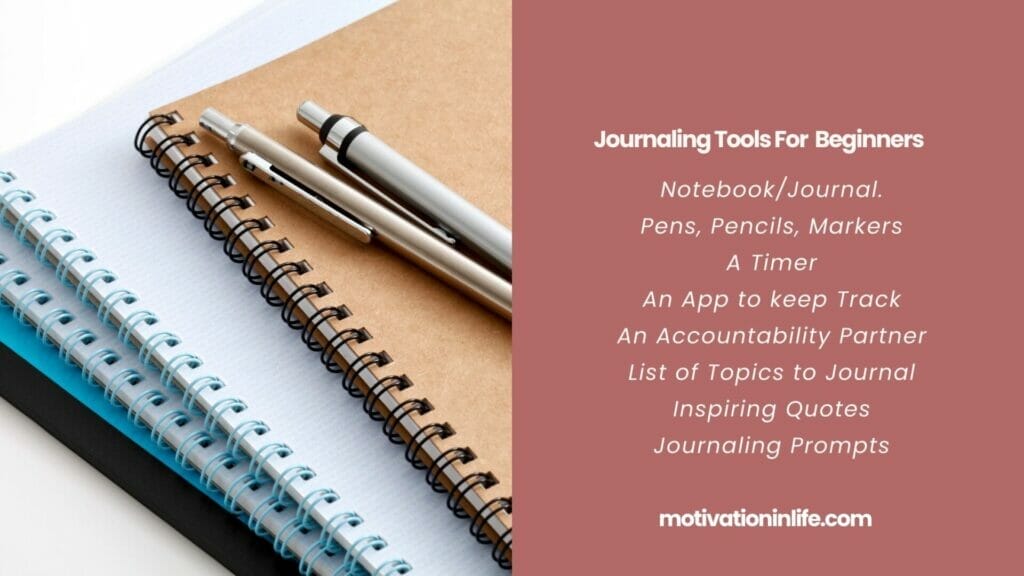
The 7 Must-Have Tools For The Journaling Beginner
Journaling is an important part of mental health. It helps you master your mindset. It also helps create a sense of self-awareness and insight.
The journaling beginner needs to have the following tools:
1) A notebook or journal to write in or some digital notebook like Evernote.
2) Pens, pencils, markers, or other stationeries that they are comfortable with.
3) A timer for timed writing sessions
4) An app to keep track of their progress
5) A supportive friend or family member for encouragement and accountability
6) A list of topics to journal about (ex: what you ate today, how you feel about your work day, what you did today…)
7) An inspiring quote from a famous person as an inspiration for writing prompts.
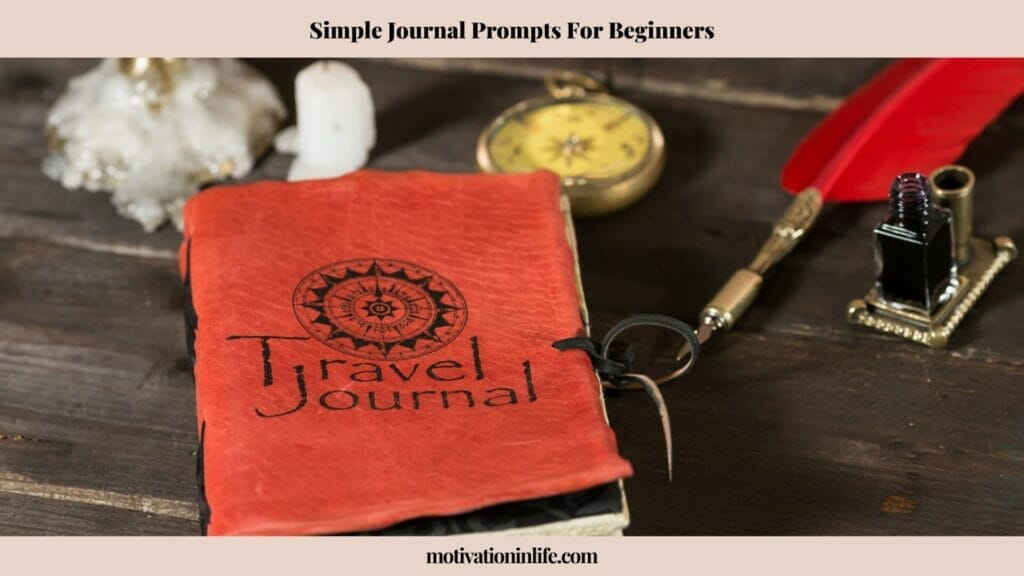
7 Tips For Simple Journaling Prompts To Start Your New Journal
Many people have trouble starting their journals. For some, it is a lack of time, for others, it is a lack of inspiration. Especially if you have never tried to inculcate the habit of journaling it can initially seem daunting.
Whatever the case may be, here are five tips that will help you get started!
1) Find the right time and place to write. Get a notebook or create a document on your computer
2) Write about what you are feeling at the moment.
3) Write about your goals and what you want to do in life.
4) Write about your successes and failures.
5) Make a list of things to write about in a journal.
6) Use simple journal prompts or quotes to get your creative juices flowing.
7) Look up ideas to write about in a journal.
The golden rule is to write whatever comes to mind. There are no rules!
Why You Should Stick With Journaling: Key Takeaways
We have all been there. You have a shelf full of unfinished journals that you were going to start and never did. Now is the time to get started on your journals!
The most important thing is choosing the right journal writing exercises for you. There are many different forms of journaling and as a beginner, it is important to find one that suits your needs and interests.
There are many benefits to keeping a journal, but one of the most important ones is that it helps you stay mindful and focused on what you are doing in everyday life.
It also helps with self-reflection, which can be very beneficial when trying to understand yourself as a person and how you interact with others in your life.
If you are struggling with mental health issues, or if you want to improve your well-being, journaling can be a helpful tool.
If you want to develop the habit of journaling then you may also read our blog post on Journaling Ideas For Self Improvement. This will help you to understand how journaling can steer you forward on your path to self-growth.
Recommended Books To Read On Learning More About Journaling
- Journal To The Self By Kathleen Adams (Amazon.com | Amazon.in)
- The Creative Journal By Lucia Capacchione (Amazon.com | Amazon.in)
IF YOU ENJOYED READING THIS POST, PLEASE PIN ONE OF THESE IMAGES BELOW!
I will be grateful for your kind gesture. Thank you!
